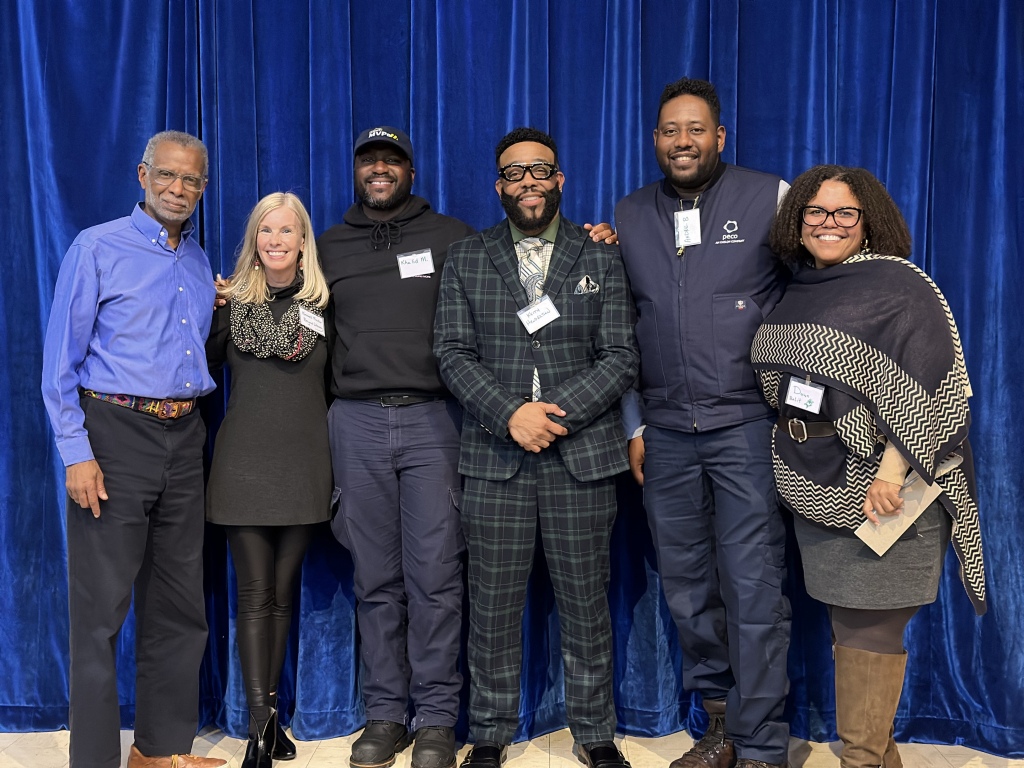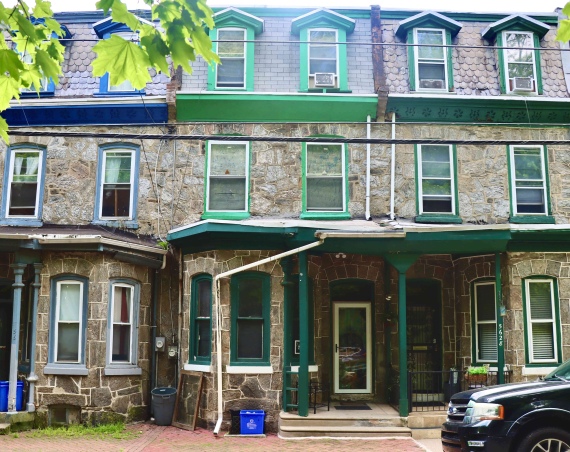The pilot project, spearheaded by State Senator Art Haywood and his team, has assembled a task force of employers and community organizations to help people move from poverty wages to more sustainable pay.

Senator Haywood, Beyond Literacy’s Kimmel Proctor, Khalid Ali McDaniel, Keith Henderson- PECO manager of Technical Operations and PECO Workforce Development, Andre Brown, and Dawn Hannah from Beyond Literacy. (Photo: Wallace Weaver)
State Senator Art Haywood and his team have made a commitment to East Germantown. According to U.S. Census Bureau data, as reported by the Philadelphia Inquirer, East Germantown was one of the few neighborhoods in Philadelphia whose overall median income dropped from 2008-2012 to 2018-2022.
The same data revealed that the median income in East Germantown, which covers Philadelphia’s 19138 and 19144 zip codes, dropped by 25% in ten years.
So the commitment was simple–take 50 people in the East Germantown area earning $20,000 to $30,000 a year and raise their pay by $10,000 to $30,000 more a year within a 12-to-18-month time period. The journey attached to the Raise Your Pay East Germantown (RYP) initiative, however, is a bit more complicated.
A four-step plan has been created to increase the wages and incomes of selected residents of East Germantown. The plan involves a task force of community organizations that offer support services, credential programs, and career readiness programs. Additionally, there are apprentice programs that can help build labor skills, and employers who can offer jobs have been identified, which will be a high priority for individuals participating in this initiative. While employment is not guaranteed, employers have also committed to making job opportunities available to those working through this initiative.
Targeted folks include working parents and younger people ages 18-24 who may not have a consistent and sustainable wage even though they are working. Donovan Dixon, the district representative for State Senator Haywood’s office and the lead on the RYP initiative says these are broad target categories for outreach for the program.
While the intention of this initiative is to support locals, Dixon also knows that this is a pilot project, and there will be a learning curve and roadblocks to navigate around.
He says, “It is my aspiration that everyone who enters into the program walks away with either greater clarity about their life path, what their career ambitions, what their career goals are, and that we’ve assisted them in reaching that goal. Because while employment is, of course, the flashpoint of this initiative, it’s not the only factor.”
He continued, “There’s also apprenticeship work, there’s also credentialing. There’s also people who may need GEDs, people may need expungements, people may need social support services. So it’s just trying. It’s acknowledging that our goal is employment, but there are other barriers that people confront before they can even reach that.”
Dixon brings up points the project is exploring–ways they can support working folks as they try and raise their wage. At their March 6, 2024, community meeting at Pastorius-Richardson Elementary School, a young man who was interested in the program noted their felony charge from over ten years ago and how it’s been difficult to find a sustaining job because of it.
It’s one of the barriers that some folks face in finding better-paying jobs. Haywood and his team also acknowledge that Pennsylvania’s minimum wage is a barrier. His office has already been working on raising the minimum wage to $15 an hour.
Executive Director of Face to Face Mary Kay Meeks-Hank weighed in on the initiative and echoed Dixon’s sentiments about the challenges that may arise. She says, “Even though it’s good in so many ways, it can also raise a lot of difficulties that people didn’t expect.”
Face to Face is one of the support organizations on the task force. Meeks-Hank says they’ve been able to refer many of their clients to the program and to consult on what folks may need, besides jobs, as they go through the process. These basics may include getting a new ID, talking to a lawyer or social worker about housing issues, and talking to a therapist about overall anxiety and other feelings as they go through big life transitions.
Another important support organization on the task force is Beyond Literacy, a non-profit providing free education and programs for adult learners and families to get into pre-apprentice and apprenticeship programs, help improve their digital literacy and workplace skills, and prepare their students for entrance exams into employment and academic paths.
Khalid Ali McDaniel, who currently works two jobs, took Beyond Literacy’s programs to prepare and pass the qualifying test to get into the PECO pre-apprenticeship program. Beyond Literacy has a partnership with PECO to teach their students how to prepare for their Construction and Skilled Trades Selection System (CAST) tests. It took McDaniel to take the class multiple times to pass the test, but for him, it was worth sticking with it.
“I told people about it, people that I used to work with, people that I work with (now), I told them about the Beyond Literacy program. I’m like, it’s free education. I was just focused on trying to pass the test to get into PECO, but it can help you with just basic adult education, to pass some of these tests, you might want to get into a union somewhere or whatever, but, you know, you have to have a certain level of academics to pass these tests, right?”
Dawn Hannah, Beyond Literacy’s Chief Programs and Impact Officer, said their specific knowledge on serving adult learners will be helpful for this initiative.
“BeLit serves plenty of folks who have their high school diploma who, for various reasons, couldn’t pass employer placement or college placement tests. Just having that diploma is not enough. It’s important to recognize that that may be the case for some of the folks in the East Germantown area, and if that is the case for them, then having the diploma is not to say a person is ineligible. The pilot has to be able to accommodate and meet the needs of folks who would otherwise be set aside. That is why BeLit is part of the pilot,” says Hannah.
Germantown United CDC and PA Careerlink of Northwest Philadelphia are other community organizations on the task force. Schools like La Salle University, Community College of Philadelphia, and Manor College are also on the list as credential and academic readiness partners and possible employers. Other employers on the task force list include SEPTA and the Jefferson Collaborative for Health Equity, alongside PECO.
Rochelle Culbreath, SEPTA’s manager of legislative affairs, knows that SEPTA is honored to be a part of the task force. Although they cannot guarantee any positions, they can intentionally announce upcoming job fairs and job openings to the task force, and Culbreath knows what a stable and well-paid job can do for families. She thanks State Senator Haywood for his vision on how to improve the East Germantown community.
Culbreath says, “I totally believe in higher wages and a supportive job and how it changes the trajectory of the life of an individual and a family. I’ve seen it here. I’ve been at SEPTA for 18 years. I’ve seen someone come into this job in many forms of positions in this company, and it completely transforms and changes the trajectory of their lives and of their families’ lives. And so I believe in exactly what he’s doing.”
You do not need to be a resident from the East Germantown area to participate in this program, but there is a preference for folks from there. For more information on the program and to apply to raise your wage, go to this link and fill out the form. Donovan Dixon will reply with some guiding next steps.



